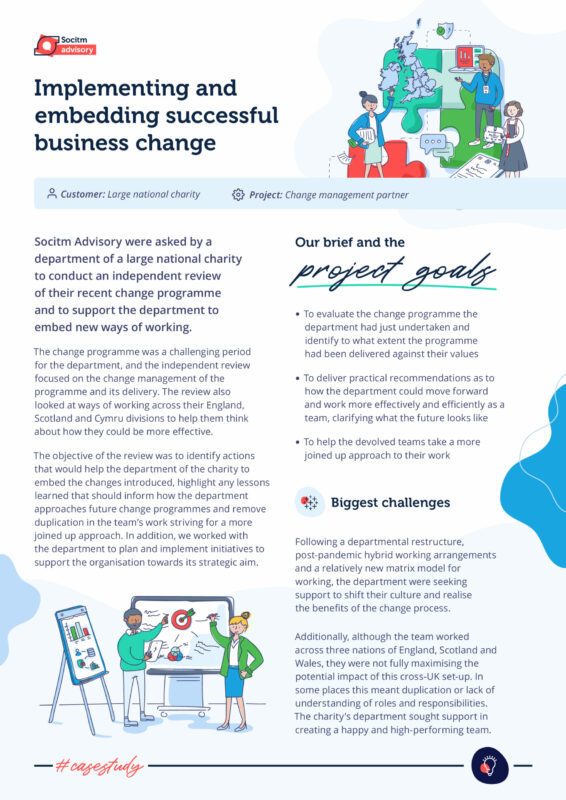Background
Socitm Advisory were asked by a department of a large national charity to conduct an independent review of their recent change programme and to support the department to embed new ways of working.
The change programme was a challenging period for the department, and the independent review focused on the change management of the programme and its delivery. The review also looked at ways of working across their England, Scotland and Cymru divisions to help them think about how they could be more effective.
The objective of the review was to identify actions that would help the department of the charity to embed the changes introduced, highlight any lessons learned that should inform how the department approaches future change programmes and remove duplication in the team’s work striving for a more joined up approach. In addition, we worked with the department to plan and implement initiatives to support the organisation towards its strategic aim.
Our brief and the project goals
- To evaluate the change programme the department had just undertaken and identify to what extent the programme had been delivered against their values
- To deliver practical recommendations as to how the department could move forward and work more effectively and efficiently as a team, clarifying what the future looks like
- To help the devolved teams take a more joined up approach to their work
Biggest challenge
Following a departmental restructure, post-pandemic hybrid working arrangements and a relatively new matrix model for working, the department were seeking support to shift their culture and realise the benefits of the change process.
Additionally, although the team worked across three nations of England, Scotland and Wales, they were not fully maximising the potential impact of this cross-UK set-up. In some places this meant duplication or lack of understanding of roles and responsibilities. The charity’s department sought support in creating a happy and high-performing team.
Our approach
The work was delivered over two phases.
In the first phase of work the recent change programme was reviewed and we looked at how the devolved teams worked together. We worked with the charity;s department to understand the current challenges they faced and co-designed a cultural change programme.
Based on our findings, we made recommendations for the organisation to take forward, and how to manage future change programmes.
In phase two, we implemented our recommendations:
- Progress tracker – detailing the activities Senior Managers were working on, each with targets
- Leadership programme – a bespoke leadership training programme, designed and delivered by Socitm Advisory consultants, using the VUCA (volatility, uncertainty, complexity, and ambiguity) model, giving senior management the tools and resources they needed to lead through change and uncertain times, and to embed ongoing training in the department
- Department story – co-creation of the charity’s department narrative. ‘Our department story’ set out their vision, purpose and ways of working to ensure employees knew where the organisation was heading, and they had a shared vision for the future
In the final part of phase two, we led a full team away day, bringing everyone together and uniting them behind the department’s future ambitions.
Outcomes & benefits
Our work to take the charity’s department on the change journey has resulted in a positive culture shift and more effective working. The department now has:
- A united team that is working towards a known vision and purpose
- Employees who are working to the charity’s and department’s values and in a common way
- Employees who are more engaged in their work and workplace
- Leaders who feel equipped to lead their teams through ongoing change and uncertainty
The charity is now considering how to use the leadership programme with other departments in the UK branch of the organisation.
Notable learnings
The proposal originally agreed, we didn’t deliver. Following engagement with the department and understanding the challenges, a programme we co-created with the charity’s department worked much better in solving their challenges.
